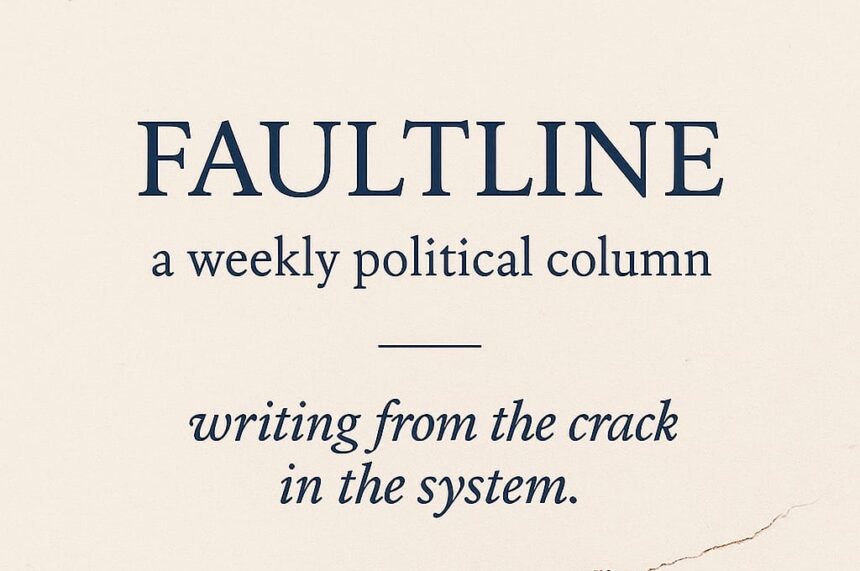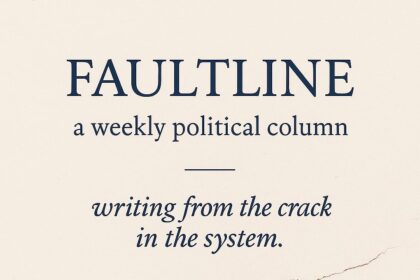In 2018, a group of young students in Lahore gathered to organise the Students Solidarity March. They were loud, earnest, and poetic in the way they demanded the right to unionise and retrieve control of the future they were so systematically being sidelined from. As Faiz inhabited the streets and placards of resistance raised in unshakeable urgency, it almost felt like the country might listen. Months later, many of those students were exhausted. Some were surveilled; others tried desperately to finish postponed dissertations on weaponised social stratification and whatnot, all the while slowly disappearing from the public eye.
Pakistan has always made resistance feel urgent and impossible. Urgent, because the state continuously brutalises the vulnerable; impossible, because it has mastered the art of co-optation and appropriating aesthetics for structural delay. Here, the revolution need not be crushed in the open. It is merely postponed into irrelevance to the extent that even an emotion as raw as outrage is bureaucratised.
There is a particular silence that follows political rage, a quiet ruin that one cannot place a finger on except to carry a permanent carcass of, not dissimilar to the dichotomised version of it: the emptiness after a euphoria when one begins questioning if it were ever true. For those of us who came of age in the scaffolding of resistance movements – the 2014 dharna, Long March, and Pashtun Tahaffuz Movement – outrage became our oxygen. If we were not intellectualising it every moment, acutely aware of the injustices manifesting around us; if we were not resisting our very identity and everything that made up for it, we were doing a disservice to the causes that had become our religion. But what happens when outrage becomes uninhabitable? When the anger exhausts itself and all that’s left is grief of the unknown?
The anatomy of activism barely accounts for this paradox: the disillusionment that arrives when one realises that the state, society, and even one’s own subconscious are so deeply corrupted to the extent that they cannot be cleansed through sheer moral will. This is where puritanism becomes performative (or at least that is what we are led to believe), and we reach the greater epiphany: that even our revolution is not accompanied by a reward system. There is no prize, no warning, only the silence of decades of prejudiced res publica falling, however long and gruesome a period it may take. Truthfully, very few are willing to see it through. It may chew through your twenties, leaving you with unpaid therapy, an inability to trust any institutional structure again, and (most probably) a sparse resume. Then it moves on to younger voices, disorienting fresher wounds, and you are left to metabolise the weight of everything you tried to carry.
While anger is the lifeblood of radical politics, what we often forget is that it does not possess the ability to be inexhaustible. In its aftermath, many find themselves in uncertain terrain, the grey area where they are neither optimistic enough to rebel nor detached enough to assimilate back into the strata they shunned their entire lives. This middle ground, between belief and bitterness, is rarely spoken of but is becoming increasingly common. This phenomenon, however, is not uniquely Pakistani but a global symptom of the post-radical. Decades ago, Antonio Gramsci defined the sophisticated boundaries between the “war of manoeuvre” and “war of position”, where the former is observed by short, dramatic ruptures, while the latter is a strategic cultural struggle. Sadia Abbas, too, explores how political quietism plays as aesthetics and piety when it counterintuitively serves as forms of refusal too subtle for the state to indict.
Together, these ideas complicate what the revolution is perceived to be: loud, emotional, linear. What of endurance, instead of power? Cynicism takes the lead here as an effective strategy to counter this dissonance. When one begins inhabiting their politics without allowing themselves to be devoured by them – reading the manifestos, marching the protests, filing the petitions – all these actions do not create tangible change except for your capacity to feel. The emotional economy of romanticising resistance movements and the institutional betrayal received in exchange breeds a generation that is aesthetically leftist but existentially frayed. They critique the same theories that defined them and laugh at the slogans once dear, not because they were wrong, but because they were not enough. And in a state of post-revolution, nothing changes but the language.
It is important to consider that there exists a class element here too. Radicalism is often performed by the middle class but sanitised by the working class. The day labourer in a South Punjab town does not have the luxury of ideological fatigue or retreating into academic abstraction as a safety net. He cannot wake up one day and decide to stop being angry. His hunger ensures the revolution is not optional.
What this author believes in, though, is that anger does not necessarily have to be the noblest emotion. The death of rage is not defeat but an opportunity for evolution: a state of continuous becoming into something non-performative. When the body rejects another adrenaline, it creates space for a return to things that cannot be scaled. We must resist the pressure to become incandescent. The world isn’t fixed, but your best act of revolt is self-preservation, of ensuring that our humanity does not get flattened to a single note, because no regime, ideology, or system is worth the price of losing your emotional range.
In the end, the most radical thing you can do is remain soft in a world that hardens you. But perhaps softness, too, is strategy, not retreat. It is what Gramsci might have called the true war on position – a deliberate resistance in both culture and spirit. Sometimes, holding space for mourning, nurturing interpersonal intimacy, and reimagining what change could look like: this is how we survive the long revolution.





